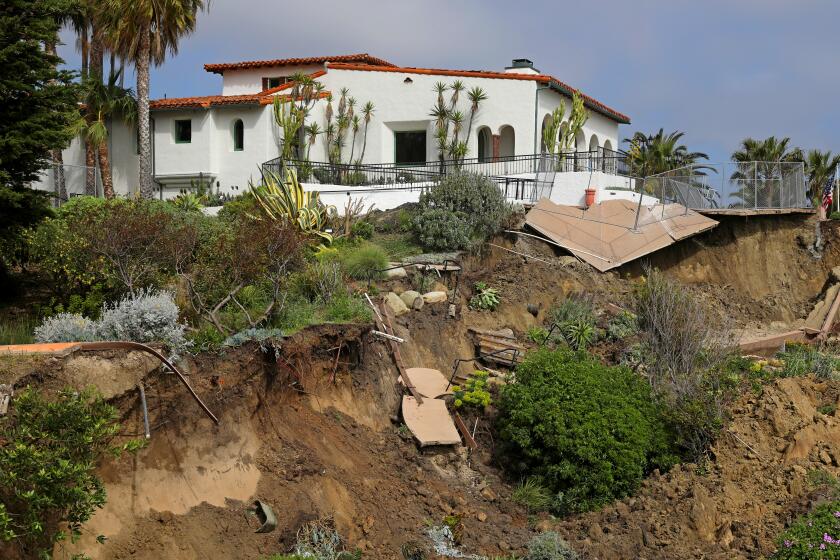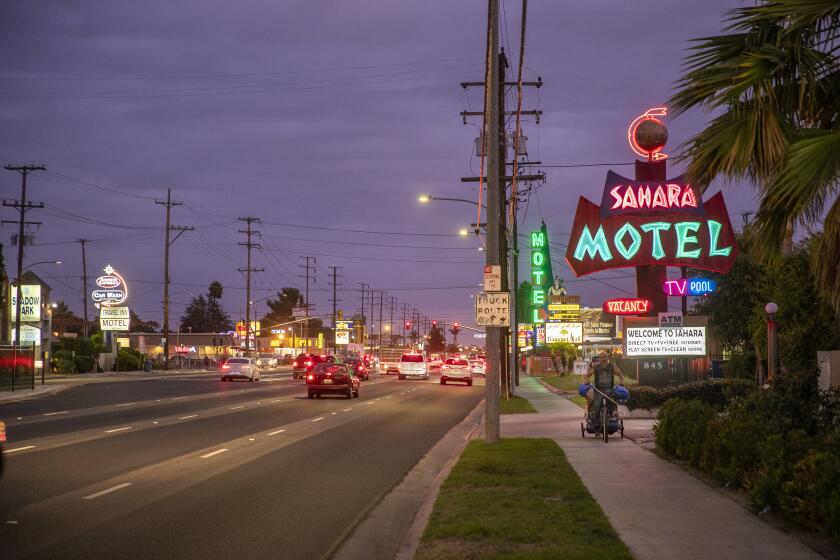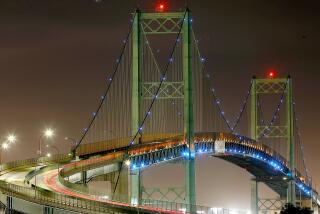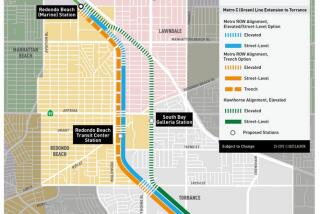Amid crumbling cliffs, Orange County considers moving its famously scenic rail line inland
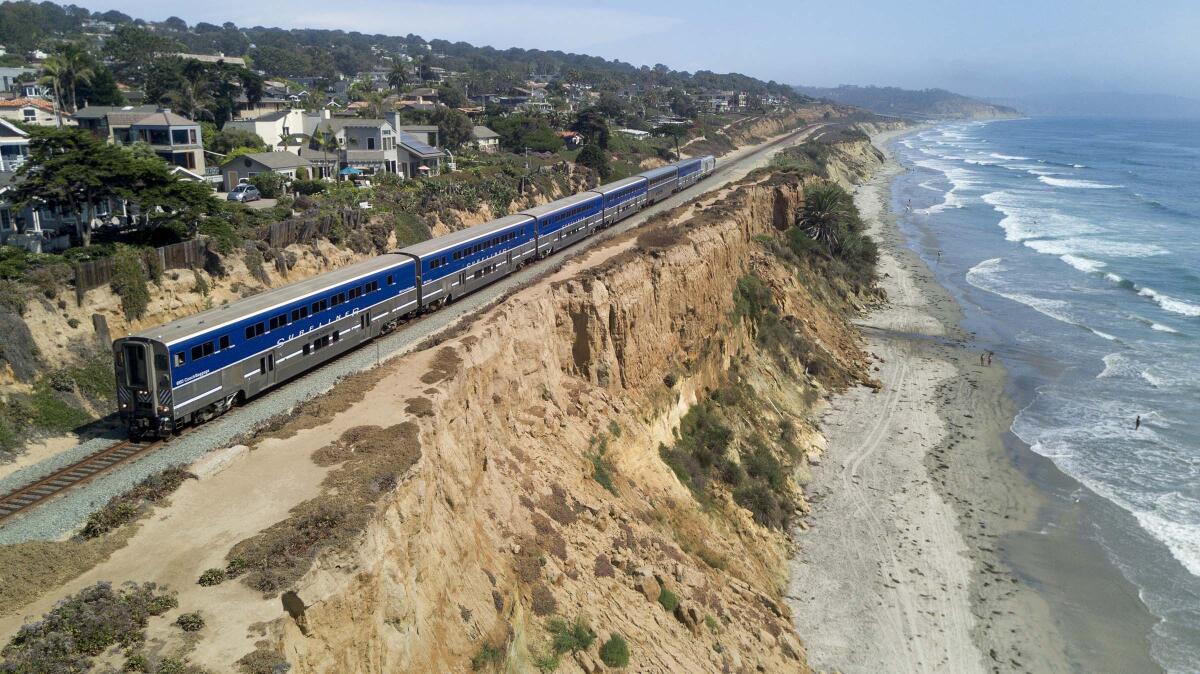
- Share via
It’s among the nation’s most iconic and heavily utilized passenger rail lines, linking Southern California’s cities via a stunning coastal route. From the grassy headlands of San Luis Obispo to Orange County’s wide-open beaches and San Diego’s oceanside bluffs, the so-called Lossan rail corridor is famous for its breathtaking views of the pounding Pacific.
But can it last?
Between crumbling bluffs and relentless beach erosion, regular passenger service along the Lossan (short for Los Angeles-San Diego-San Luis Obispo) corridor has been shut down in southern Orange County for all but a few weeks since last September. Amtrak’s Pacific Surfliner train has shifted to replacement buses that ferry passengers through traffic and sprawl further inland, while Metrolink has simply stopped serving key tourist destinations such as San Clemente.
A growing chorus of Orange County elected officials and transportation leaders are asking whether it’s time to abandon portions of the coastal route for good, moving the tracks inland to areas that are less scenic but far more reliable. San Diego County is already pursuing a similar course in Del Mar, where the Lossan tracks snake atop eroding sandstone cliffs.
Transportation planners say moving portions of the Orange County route inland would probably cost upward of $5 billion. But advocates for the plan note the county has already invested tens of millions on short-term solutions and is poised to throw millions more into efforts that won’t solve the ultimate problem: geologic instability that will only accelerate with climate change.
“The only alternative to moving the tracks is to spend endlessly on a losing ‘protect in place’ strategy,” said state Sen. Catherine Blakespear, a Democrat whose district encompasses southern Orange County and northern San Diego County.
Blakespear chaired an informational hearing in May on the future of the rail line, where much of the discussion focused on the potential for track relocation in south Orange County and Del Mar.
In Orange County, San Clemente is the current focal point for the Lossan corridor troubles. The tracks there wind along a relatively narrow beachfront, close against unstable sandstone cliffs. Passenger service was suspended in April and again in June after landslides beneath historic Casa Romantica, a cultural landmark and prized wedding destination. The April slide came just two weeks after passenger service had been fully restored after a six-month, $13.7-million effort to stabilize the sand beneath the tracks that had shifted because of a landslide and tidal erosion two miles south.
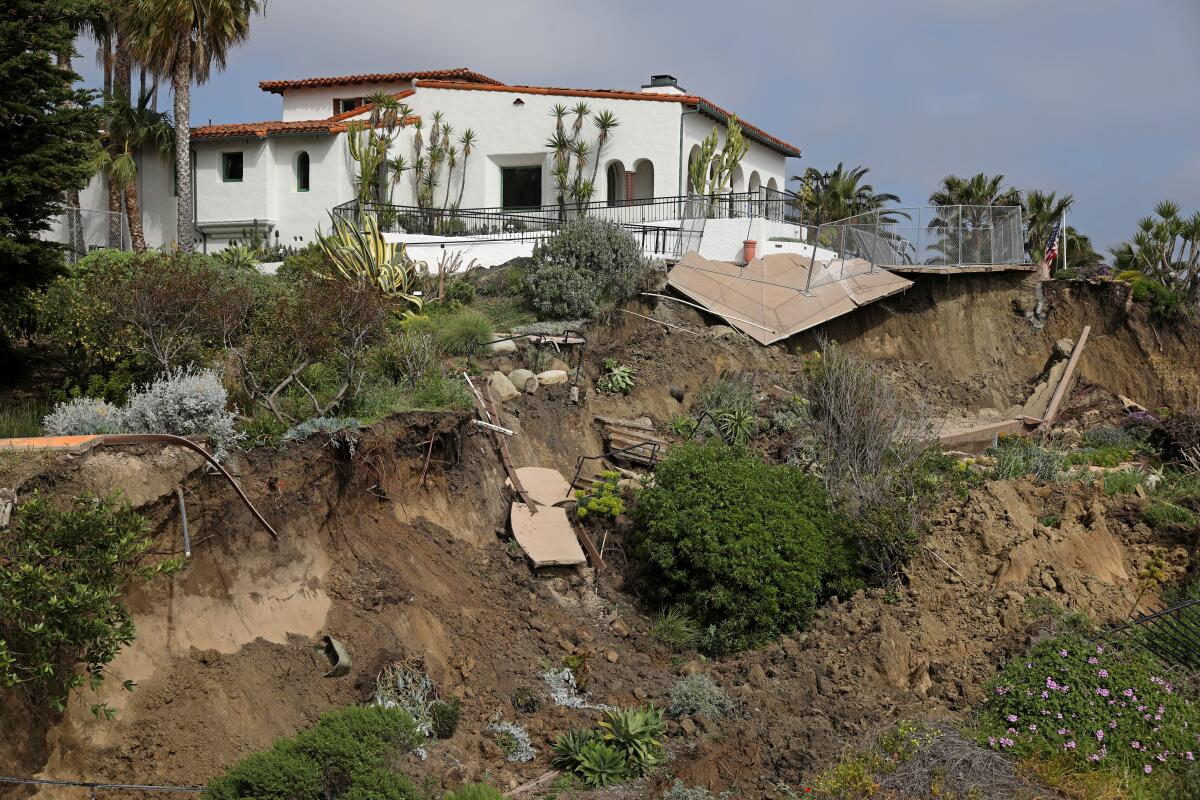
The Orange County Transportation Authority’s Board of Directors has declared an emergency effort to protect the tracks from future landslides beneath Casa Romantica. A temporary wall to shield the railway from falling rock and debris will be fast-tracked, at a cost of about $6 million. County Supervisor Katrina Foley, who sits on the transportation board, said the state will fund $3 million of the cost for a barrier that could span 15 feet tall and 300 feet long.
“We’ve got to secure the railroad tracks from the falling debris, because it’s going to take too long to secure the hillside,” she said. “We cannot keep the tracks closed while we’re waiting for that to happen.”
A landslide beneath the historic Casa Romantica in San Clemente underscores the threat of coastal instability exacerbated by last winter’s powerful storms.
In recent months, the county has invested in other costly stabilization efforts, including drilling massive steel anchors into the bedrock of the bluffs in San Clemente and bringing in more than 18,000 tons of boulders to counter beach erosion. The federal government recently pledged $9.3 million to fund the first phase of a decades-long sand replenishment project aimed at restoring San Clemente’s narrowing beaches.
Last winter’s drenching storms exacerbated the coastal instability. In Orange County, fractures in the saturated cliffs caused an estimated $26 million in damage to public and private property. Statewide, more than 700 landslides were reported in January alone, according to the California Geological Survey.
“Bluff failures and beach loss are going to become more chronic,” said Patrick Barnard, research director of the USGS Climate Impacts and Coastal Processes Team. “The rate of sea level rise has tripled since the 20th century. The pressures put on property and infrastructure aren’t just going to go away.”
The Lossan track closures have proved an economic drain. Winding 351 miles from San Luis Obispo to San Diego, the corridor is the second-busiest passenger route in the nation. Passenger trains, operated by Amtrak and a mix of local jurisdictions, carry nearly 8 million passengers annually, bringing in tourists and weekend beachgoers, as well as the shop clerks and restaurant workers who serve them.
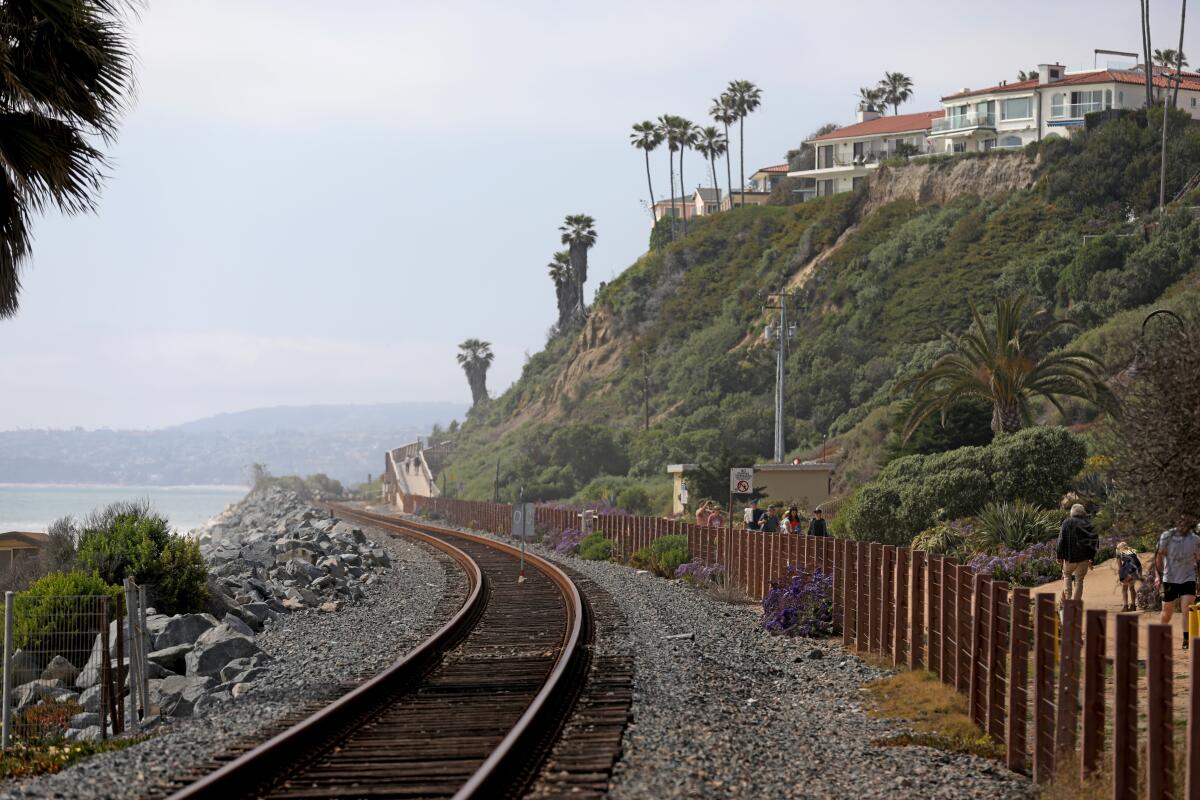
Lossan is also a substantial freight corridor, moving a billion dollars a year in goods. It links major military bases in the state, including Vandenberg Space Force Base and Camp Pendleton, and is the sole route to transport potentially hazardous waste from the shuttered San Onofre nuclear power plant.
Burlington Northern and Santa Fe Railway’s freight trains recently resumed travel along the route, but they haul steel, potash and other cargo at a slow crawl through San Clemente as a safety precaution.
And passengers have traded Orange County’s scenic ocean views for a bus bridge that shuttles them inland from Irvine to Oceanside along featureless, often heavily congested freeways.
For San Clemente business owner Mikii Rathmann, the track closures have been as gloomy as the marine layer that stubbornly hangs over the beach town at the start of summer. Passenger trains haven’t passed through the city since June 5.
Mikii’s on Del Mar, a party supply store and gift shop, has seen a sales decline without the influx of visitors who typically exit the trains near the pier and roam downtown’s eclectic mosaic of restaurants, pubs and shops. Rathmann said she has seen far fewer takers for beach towels, coasters and other “San Clemente”-emblazoned souvenirs.
“When the tracks restarted, we immediately saw customers back in the store,” she said. “We were excited, but then that other landslide happened, and it’s been a real bummer.”
Before San Clemente became a hot spot along the corridor, Del Mar experienced seven slope failures that affected rail service from 2018 to 2021. Repair work has totaled nearly $100 million. And the bluffs continue to retreat 6 inches a year.
The San Diego Assn. of Governments, which oversees transportation projects in the county, has drafted a blueprint to move a 1.7-mile stretch of tracks in Del Mar away from the coastal bluffs, where the rail line has run for more than a century. Preliminary plans include laying a portion of the route in an underground tunnel, a first for the corridor.
The project is expected to cost upward of $3 billion. But San Diego County officials said, in the long term, leaving the tracks where they are would prove far more costly.
“We’re looking at the potential economic impact, especially if we’re not able to use the corridor to move goods,” said Coleen Clementson, deputy chief executive of the San Diego Assn. of Governments. “We think the losses could be billions of dollars. We use that rail corridor to bring goods from the Port of San Diego up to Los Angeles.”
The agency has secured $300 million in state funding, which has gone to securing engineering and environmental clearance for construction. Clementson said the county also hopes to get substantial funding from the $1-trillion federal infrastructure bill signed into law in late 2021. The goal is to have trains operating on the realigned tracks by 2035.
While Del Mar pushes forward on track relocation, the Orange County Transportation Authority has just launched a study, funded by a $5-million state grant, of the costs and implications of relocating an 11-mile stretch of track around San Clemente.
At Blakespear’s informational hearing, Darrell Johnson, the county transportation authority’s CEO, said he is opting to wait for the findings before committing to track realignment. “We are uncomfortable with claiming that relocation is the answer until it’s looked at by all parties,” he said.
Blakespear, seemingly exasperated by the hesitancy, pressed county officials for bolder action. “There isn’t really an option for Orange County not to move those tracks,” she told The Times after the hearing.
Beach Boulevard, once Orange County’s ‘Road to Summer,’ is better known in recent years for sex-trafficking and drugs. Now, three cities are pushing to reimagine the historic corridor.
The Rail Passenger Assn. of California & Nevada, which advocates for modern passenger rail, has long backed moving the train tracks inland — trading scenery for reliability — and well before global warming turned the conversation into a crisis.
“It takes three hours between L.A. and San Diego by train,” said Paul Dyson, RailPAC’s vice president of government affairs. “Right now, the Surfliner carries about 8,000 to 10,000 people a day. That’s a tiny fraction of the total market. It could do so much more.”
Dyson argued that track realignment would not only move the trains out of harm’s way but also make for a faster and more competitive passenger rail service. But the difficulty in getting multiple agencies to act in tandem for big projects also has RailPAC advocating for a political reroute.
The corridor is governed by an 11-member board, drawn from nine separate transportation and planning agencies.
“It’s a board that doesn’t have a lot of power or the means to do these major projects,” Dyson said. “There are too many different agencies involved in trying to make a decision and then applying for the various funds that will be needed. The corridor should be under a unified agency.”
Back in San Clemente, Rathmann reasons that the future of the tracks will ultimately involve some sort of compromise. For now, she’s just hoping the temporary wall going in below Casa Romantica will be enough to get the trains back on schedule before summer’s end.
“I’m a cup half-full kind of gal, even though this has been a tough year so far,” she said. “June gloom will end, and the Surfliner will ride again.”
More to Read
Sign up for Essential California
The most important California stories and recommendations in your inbox every morning.
You may occasionally receive promotional content from the Los Angeles Times.
